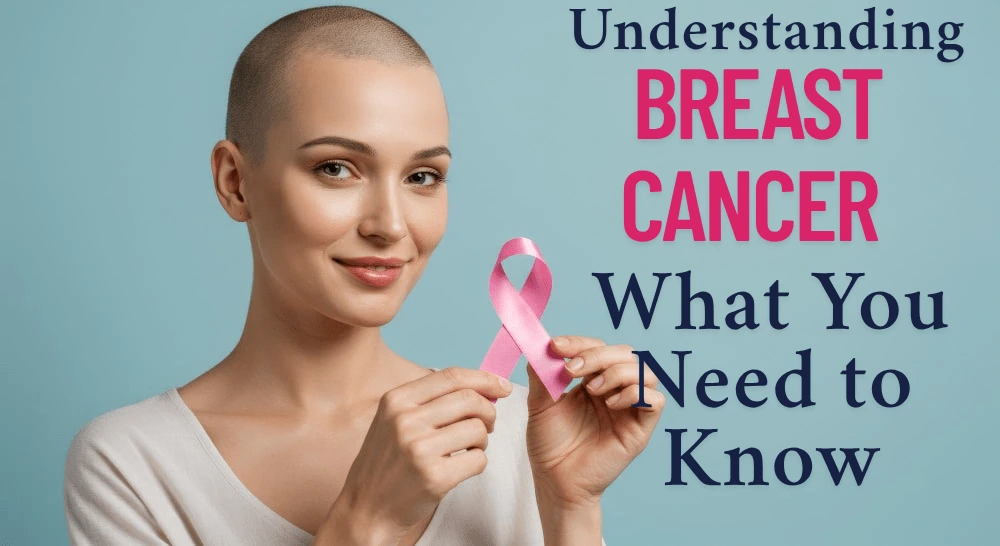Breast cancer is one of the most common diseases in today’s world. Just hearing the words can bring fear, confusion, and many questions. But now, more than ever, there is hope. Thanks to greater awareness, improved screening methods, and advanced treatments, the chances of successful outcomes are increasing every day. Whether you’re learning for yourself, supporting a loved one, or simply staying informed, understanding the basics of breast cancer is an important step toward taking control of your health.
What Is Breast Cancer?
Breast cancer is a disease in which cells in the breast grow uncontrollably. It can begin in different parts of the breast, such as the ducts (where most cancers start), lobules, or connective tissue. While breast cancer is most common in women, men can also be affected.
Risk Factors: What Increases Your Risk?
There’s no single cause of breast cancer, but several factors can increase your risk:
- Age – Risk increases with age, especially after 50.
- Family History – Having a close relative with breast cancer can raise your chances.
- Genetic Mutations – BRCA1 and BRCA2 mutations are the most well-known.
- Hormonal Factors – Early menstruation, late menopause, or hormone replacement therapy may play a role.
- Lifestyle – Alcohol use, obesity, lack of physical activity, and poor diet can contribute.
Keep in mind: Having risk factors does not mean you will develop breast cancer—and not having any doesn’t guarantee you won’t.
Signs & Symptoms to Watch For
Early detection is crucial, and knowing what to look for can save your life. Common signs include:
- A lump or thickening in the breast or underarm
- Change in breast size, shape, or appearance
- Dimpling or puckering of the skin
- Nipple discharge (especially bloody or clear)
- Pain in the breast that doesn’t go away
- Redness or flaky skin on the nipple or breast
If you notice anything unusual, don’t wait—talk to your healthcare provider right away.
Screening: Your Best Defense
Screening can help catch breast cancer early, when it’s most treatable. Here’s what the general guidelines recommend:
- Mammograms – Women ages 40–74 should get a mammogram every 1–2 years (starting age may vary based on risk).
- Clinical Breast Exams – Often part of a regular check-up.
- Self-Awareness – While formal “self-exams” aren’t always recommended, being familiar with how your breasts normally look and feel is important.
If you’re at higher risk, you may need additional screening like breast MRI. Talk to your doctor about what’s right for you.
Diagnosis & Treatment
If cancer is suspected, tests like imaging, biopsy, and lab work are used to confirm and classify it. Treatment depends on the type, stage, and personal preferences, but may include:
- Surgery – Lumpectomy or mastectomy
- Radiation Therapy
- Chemotherapy
- Hormone Therapy
- Targeted Therapy
- Immunotherapy (for certain types)
- fasting may help in cancer treatment and prevention, but the science is still emerging.
Every journey is different, and treatment plans are tailored to the individual.
Living Beyond Breast Cancer
Survivorship is part of the story. Many women go on to live long, full lives after treatment. Support groups, mental health care, physical rehabilitation, and follow-up visits play a critical role in recovery.
October is widely known as Breast Cancer Awareness Month, but education and action shouldn’t be limited to just one month a year.
What You Can Do Today:
- Know your family history.
- Schedule your screenings.
- Maintain a healthy lifestyle.
- Be breast aware.
- Support research and awareness.
Final Thoughts
Breast cancer affects millions—but it doesn’t define them. Advances in research, community support, and early detection have changed the landscape of this disease. The more we talk about breast cancer, the more we learn—and the more lives we can save.
If you or someone you love is facing breast cancer, know that you are not alone. Support, information, and hope are always within reach.
Have a story to share or a question to ask? Leave a comment or connect with us. Let’s keep the conversation going.




Pingback: Understanding Cancer: What Everyone Should Know - Do it yourself Live Life